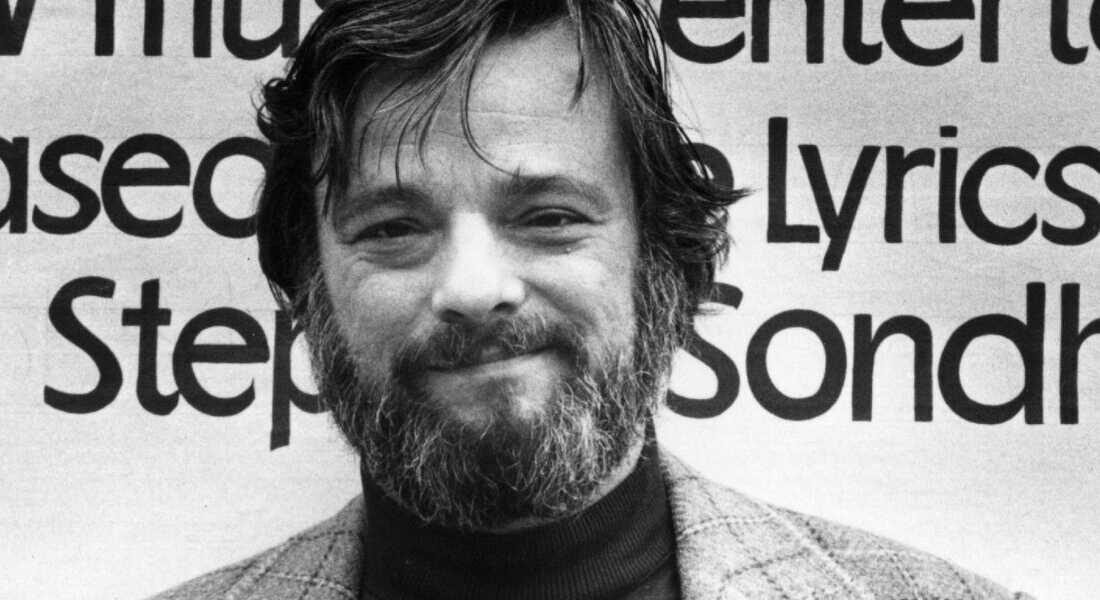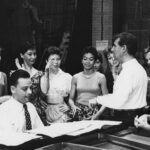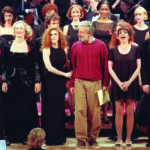Welp, the COVID gods giveth and the COVID gods taketh away. Broadway was “back in business,” and then the Omicron variant reared its infectious head and New York City plunged back into uncertainty.
On the bright side, with tightly enforced vaccine and mask mandates, a condition for Broadway attendance, theatres have remained a safe destination for audiences. It has been, however, something of a quagmire for producers with cast members testing positive left and right. Most shows have had to cancel multiple performances as Omicron moved through casts with numerous principals and understudies out of commission for 10 days at a time.
Some shows could not withstand the additional draw on resources and, as of this writing, both Ain’t Too Proud and Thoughts of a Colored Man have posted closing notices. Taking a different approach, Mrs. Doubtfire has gone on a temporary hiatus, with performances scheduled to resume March 14th.
It remains to be seen how quickly we can come out of this latest COVID setback. But since there are not a ton of new shows opening and the few that are could potentially wind up getting pushed out a month or two. I am going to devote this issue’s column to our recently departed unofficial poet laureate of musical theatre, Stephen Sondheim, who died on November 26th.
Mark Harris said it best, for Vulture, on the breadth and depth of Sondheim’s impact:
“If it is true that, when Marlon Brando died, Jack Nicholson remarked that every other living actor just moved up one place, the image seems inadequate to mark Sondheim’s passing, at 91, after a long and astonishingly productive life. If anything, it means that the question of who America’s greatest living musical-theater artist is can finally be asked and lead to an interesting discussion, because for the first time in decades, the answer isn’t obvious. With Sondheim, there was no list of people waiting to move up one. He was his own list — and his measureless influence lives in the work of just about everyone who survives him.”
So, what then, was so great about Sondheim? There is a lot of talk about what a perfectionist he was, exacting in his attention to detail. Also, he was known as a moral and caring man concerned with the future of the theater and young artists. So, he was a good person and very professional? I do not think that quite explains the widespread fanaticism. It has occurred to me lately the answer may lie in the connection between those two aspects; his artistic excellence and ethical devotion.
Circling back to COVID for a moment, I was recently dismayed to hear one of my favorite podcast hosts keep referring to the “omnicron” variant, adding an errant n where it does not belong. Amid a media environment rife with confusion and outright misinformation, I expect this podcast host to provide me crucial information I may rely on with life-or-death stakes. If I cannot count on them (not to mention the producers and editors) to be accurate, how can I trust anything they say?
The power of Sondheim is derived from his total opposition to that sloppiness, albeit in an altogether different context. Presumably, nothing in Sondheim’s work is accidental – it has all been thought out and has a reason behind it. He was often associated with the credo: “Content dictates form.”
- View of American composer and lyricist Stephen Sondheim onstage during an event at the Fairchild Theater, East Lansing, Michigan, February 12, 1997. (Photo by Douglas Elbinger/Getty Images)
- Stephen Sondheim, Leonard Bernstein and cast during the rehearsal for the stage production ‘West Side Story’. Friedman-Abeles 1957
- Stephen Sondheim center, is flanked by performers during a curtain call for the dress rehearsal of gala ‘Sondheim: A Celebration at Carnegie Hall’ 1992 AP
Yes, Sondheim’s music can be stunningly gorgeous or infectiously upbeat. Yes, his lyrics can be witty, funny, provocative, or probing. But even more important is the trust he earns from us. As with a seasoned performer who inspires confidence in an audience, (“I got this, I got you. Sit back and enjoy the show.”), Sondheim’s conscientiousness allows us to surrender, to suspend our disbelief and truly take the emotional journey of each song and show.
I want to go through all the shows and offer you suggestions of how best to experience them. As bereft as we may be that the great man is gone and no longer writing new songs, the ones he leaves behind are an immense treasure to be relished for generations to come. I imagine people feeling this way when Shakespeare died.
West Side Story (1957)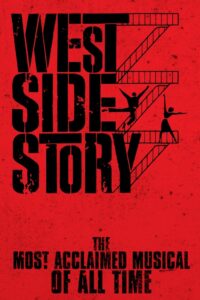
Music by Leonard Bernstein, Lyrics by Stephen Sondheim, Book by Arthur Laurents
Speaking of Shakespeare, it may be safe to estimate Sondheim is most widely known for this Romeo & Juliet adaptation set in tense 1950s New York City. He often expressed embarrassment over some of the language and imagery he used in these songs to meet Bernstein’s desire for soaring, poetic romance, but audiences have swooned for “Maria,” “Tonight” and “Somewhere” and tapped their toes to “Something’s Coming” and “America” without pause since then. There is no better way to experience West Side Story today than in Steven Speilberg’s spellbinding new film, playing at a cinema near you.
Saturday Night (1955)
Music and Lyrics by Stephen Sondheim, Book by Julius J. Epstein and Philip G. Epstein
Saturday Night didn’t get produced in New York until Second Stage mounted it Off-Broadway in 2000. The cast recording with Andréa Burns, Lauren Ward, and David Campbell is worth a listen to hear young Sondheim’s unmissable talent in songs like “So Many People,” “A Moment With You,” and “What More Do I Need?”
Gypsy (1959)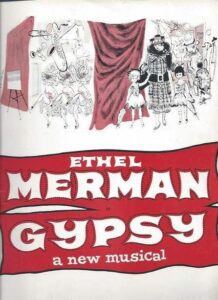
Music by Jule Styne, Lyrics by Stephen Sondheim, Book by Arthur Laurents
The next big show Sondheim worked on was a musical biography of stripper Gypsy Rose Lee that far exceeded the assignment of giving megastar Ethel Merman a solid vehicle. This was a psychological portrait in song, with the lead role of Madame Rose often called “the King Lear of musical theatre,” especially in her 11 o’clock number/nervous breakdown, “Rose’s Turn,” which is as great an example of Sondheim’s gift for character, drama, and irony – not mention rhyme and rhythm – as anything he ever wrote. Listen to the original cast recording or any of the many revivals to hear Merman or Angela Lansbury or Tyne Daly or Bernadette Peters or Patti LuPone or Imelda Staunton put their stamp on it. Or watch the TV version with Bette Midler or the 1962 movie with Rosalind Russell or go down a fabulous YouTube rabbit hole watching clips of brilliant actress-singers like Betty Buckley and Linda Lavin strutting their stuff in various productions.
A Funny Thing Happened on the Way to the Forum (1962)
Music and Lyrics by Stephen Sondheim, Book by Burt Shevelove and Larry Gelbart
Sondheim finally had a hit Broadway show featuring his lyrics and music with what has been considered the greatest farce in all of musical theatre. The 1966 movie version leaves much to be desired, including most of Sondheim’s songs, but it does preserve on film the original stage performances of legendary comedians Zero Mostel and Jack Silver, as well as Phil Silvers, Buster Keaton and a very young Michael Crawford. If you do not get into it after a few minutes, you might be better off just watching Nathan Lane and the rest of the cast of the 1996 Broadway revival perform the opening number “Comedy Tonight” at the Tony Awards on YouTube.
Anyone Can Whistle (1964)
Music and Lyrics by Stephen Sondheim, Book by Arthur Laurents
Sondheim’s next show was a flop, but a legendary one with a score treasured by fans across the globe. There is much to recommend in each of the YouTube bootleg videos of concert versions (starring Madeleine Kahn and Bernadette Peters, Patti LuPone and Audra McDonald, and Donna Murphy and Sutton Foster, respectively), but it’s evident this heavy handed, highly 1960s allegory about the residents of a mental hospital escaping into a bankrupt town, is at its best as a recording of Sondheim’s sensitive and scintillating songs like the title ballad, “With So Little To Be Sure Of,” “There Won’t Be Trumpets,” “Everybody Says Don’t,” and “A Parade In Town.”
Company (1970)
Music and Lyrics by Stephen Sondheim, Book by George Furth
The 1970s were the beginning of the golden age of Sondheim and the first in his string of collaborations with director-producer Hal Prince. This smart and funny big city musical really put him on the map, winning him the first of his Tonys for Best Music and Lyrics. What was a groundbreaking take on marriage and relationships then is still fresh now and the best way to experience it is to see Marianne Elliott’s acclaimed Broadway production starring Patti LuPone and, in the newly-reconceived-as-a-woman leading role, Katrina Lenk. The score is an embarrassment of riches, including “The Ladies Who Lunch,” “You Could Drive a Person Crazy,” “Another Hundred People,” and “Being Alive.” As my friend and podcast co-host Daniel Nolen says, “every song’s a bop.” For the indescribable 1970s flair, the original cast recording, starring Elaine Stritch and Dean Jones, can’t be beat and D.A. Pennebaker’s award-winning documentary about its recording, Original Cast Album: Company, has recently been added to the Criterion Collection for your streaming pleasure.
Follies (1971)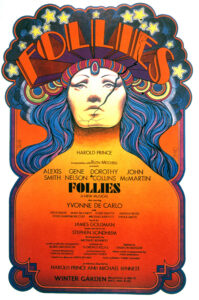
Music and Lyrics by Stephen Sondheim, Book by James Goldman
A more polarizing show than Company, Follies did not make back its financial investment, although it ran over a year on Broadway and is considered by many fans to be Sondheim’s masterpiece. The vast score contains both period pastiche numbers (like “Broadway Baby” and “Ah, Paris”) wherein the characters (retired follies performers at a reunion) recreate big moments from their long closed revue as well as deep and dark songs conveying the complexity of the characters in their contemporary lives (like “The Road You Didn’t Take,” “In Buddy’s Eyes” and “Could I Leave You?”), some so soaring as to suggest almost a modern kind of everyday opera, and maybe the closest approximation of what a straight-up Sondheim song would sound like, minus all the trappings of the individual show styles he took such great pains to adhere to. Best of all, though, may be the songs from the last section of the show when the performance and real-life realms seem to collide, such as “Losing My Mind” and “The God-Why-Don’t-You-Love-Me Blues.” The best way to take the journey is to watch the documentary about the New York Philharmonic’s all-star 1985 concert of Follies, with great behind the scenes footage and thrilling performance clips of Barbara Cook, George Hearn, Lee Remick, Mandy Patinkin, Carol Burnett and Elaine Stritch.
A Little Night Music (1973)
Music and Lyrics by Stephen Sondheim, Book by Hugh Wheeler
This show gave Sondheim his only hit pop song, “Send in the Clowns,” when recordings by both Judy Collins and Frank Sinatra ascended the charts. As even a cursory Google search can tell you, this song has been done by about every singer alive during Sondheim’s life. But still for me none quite get the simple beauty as perfectly as Glynis Johns (who could barely sing!) on the exquisite original cast recording of this truly sophisticated, adult musical comedy. The 1977 movie version starring Elizabeth Taylor is unequivocally abysmal. Pauline Kael famously wrote, “The picture has been made as if the director (Harold Prince) had never seen a movie.” There is, however, a decent YouTube upload of City Opera’s 1990 production as seen on Live at Lincoln Center.
Pacific Overtures (1976)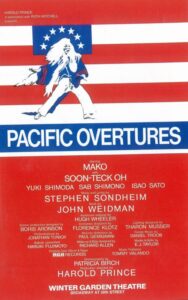
Music and Lyrics by Stephen Sondheim, Book by John Weidman
Hal Prince’s innovative, kabuki-style production depicting the Westernization of Japan, failed to deliver another smash along the lines of Night Music, but Sondheim fanatics can argue all night over the merits of their personal favorites from a score that includes “Pretty Lady,” “A Bowler Hat,” “Chrysanthemum Tea,” “Please Hello,” and (my choice) “Poems.” The original production is well preserved on a video made for Japanese TV and available on YouTube. For listening, I’m partial to the 2004 revival cast recording with B.D. Wong, Telly Leung, Francis Jue, Michael K. Lee, and Paolo Montalban.
It’s worth noting that by this point in the mid-1970s, Sondheim’s reach was wide enough that a revue of his songs, Side by Side by Sondheim (1977), enjoyed a successful Broadway run and U.S. tour following its premiere in London. The original West End cast recording with David Kernan, Julia McKenzie, and Millicent Martin is a delight and a fun sample platter of songs from everything he’d done up to that point, including stuff I’m leaving out of this already lengthy column.
Sweeney Todd (1979)
Music and Lyrics by Stephen Sondheim, Book by Hugh Wheeler
It is easy to make a case for this as Sondheim’s masterpiece. Hal Prince’s original production earned rave reviews, swept the Tony Awards, then the Olivier Awards in London and immediately instigated debate over whether it was an opera or a musical. And indeed, it has been produced by opera houses and symphonies (in addition to theatres large and small) around the world ever since. There are consequently numerous recordings and filmed productions (including Tim Burton’s decent 2007 movie) to choose from, with the best option being the PBS video of the first national tour starring Angela Lansbury and George Hearn, although I am a sucker for Patti LuPone’s thrilling singing in the San Francisco Symphony version from 2001.
Merrily We Roll Along (1981)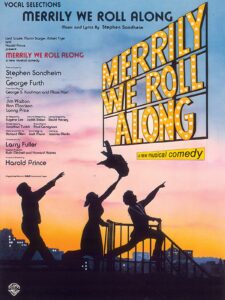
Music and Lyrics by Stephen Sondheim, Book by George Furth
Sondheim and Prince’s final Broadway collaboration was a notorious flop, closing two weeks after opening. You can’t argue with that score, though, probably the most “tuneful” and brassy Broadway sounding songs of Sondheim’s career, including “Old Friends,” “Not A Day Goes By,” “Now You Know,” “Like It Was, “Good Thing Going,” and “Our Time.” It is no wonder so many people have tried reviving this problematic piece over the years, drawn to the story of three best friends making their lives in show business, told backwards from total disillusionment to their wide-eyed beginnings. Filmmaker Richard Linklater has begun work on a film adaptation, in the vein of his Boyhood, with camera work taking place periodically over two decades to show the characters aging, starring Blaker Jenner, Ben Platt, and Beanie Feldstein. In the meantime, besides the dynamite Broadway cast recording (featuring my favorite overture in Broadway history), head to Netflix for Best Worst Thing That Ever Could Have Happened, original star Lonny Price’s fascinating and moving documentary about the now iconic 1981 production.
Sunday in the Park with George (1984)
Music and Lyrics by Stephen Sondheim, Book by James Lapine
Creating a show with a director other than Hal Prince for the first time in 20 years, Sondheim won a Pulitzer for this behind the scenes look at artist Georges Seurat’s painting of the iconic A Sunday Afternoon on the Island of La Grande Jatte and then at how a descendant of his might get along in the modern art scene. It was far from standard Broadway fare, even for Sondheim, but critics raved, and Sondheim fans rejoiced at the daring new direction. Certainly, there’s been no more humanizing look at the “art of making art” than this score, including “Color and Light,” “Finishing the Hat,” “Beautiful,” “Putting it Together,” “Children and Art,” and “Move On.” Luckily for us, the original production with definitive performances by Mandy Patinkin and Bernadette Peters was captured on video and is widely available.
Into the Woods (1987)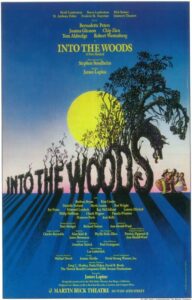
Music and Lyrics by Stephen Sondheim, Book by James Lapine
The gateway musical for most Sondheim fans born after the mid-1970s or so has represented the most accessible iteration of his work given the familiar fairy tale characters and his agile embrace of their milieu. Of course, in the second act when we find out what happens to Cinderella, Little Red Riding Hood, Rapunzel and Jack’s beanstalk, certain audience members may recoil at the dystopian darkness in the piece, but by that time they have already enjoyed a bunch of Sondheim’s most popular songs. There’s Rob Marshall’s mostly great movie adaptation with Meryl Streep, but still the best way to experience Into the Woods is via the ubiquitous full video of the original production, led by Bernadette Peters, Joanna Gleason and Chip Zien, as directed for television by Lapine.
Assassins (1990)
Music and Lyrics by Stephen Sondheim, Book by John Weidman
Sondheim’s next musical premiered Off-Broadway and then didn’t get a mainstem production for 14 years. This revue style depiction of different people who killed or tried to kill the various presidents of the United States (from Lincoln to Reagan) was thought to be too controversial at the time of the first Iraq War. As Classic Stage Company’s recent Off-Broadway revival reiterated, the theme of Americans wanting to violently impose their views on the leaders of government and the impact that has on the rest of us couldn’t be timelier. Evoking distinctive styles of American music spanning centuries (from John Philip Sousa to ‘70s singer-songwriters, big spiritual anthems to little parlor ditties), Sondheim delivered a score in top form. The original cast recording with Patrick Cassidy, Victor Garber, Greg Germann and Annie Golden is best.
Passion (1994)
Music and Lyrics by Stephen Sondheim, Book by James Lapine
This uniquely intimate and dark chamber piece – almost an opera with near constant music and no applause breaks – was certainly an odd fit for Broadway in the 90s, opening the same season as Disney’s Beauty and the Beast and the Rosie O’Donnell revival of Grease. But it didn’t matter, by this point Sondheim had been so widely recognized as the master by generations of theatregoers that even the brooding Passion won the Tony awards for Best Musical, Best Book, and Best Score. The fourth Tony Passion won that night was Best Actress in a Musical for Donna Murphy and lucky for us her galvanic, star-making performance (opposite Jere Shea and the late, great, irreplaceable, and ravishing Marin Mazzie) was captured for broadcast with Lapine again directing the cameras.
The only musical Sondheim completed after that was Road Show (with a book by John Weidman and previous titles include Wise Guys, Gold!, and Bounce), but it never made it to Broadway despite numerous fits and starts that generated two cast recordings, neither of which makes a very good case for the musical. What did play Broadway in addition to multiple revivals of many of his shows was James Lapine’s brainchild, Sondheim on Sondheim (2010), which juxtaposed fantastic interview clips (Sondheim gave good clip!) with live song performances by a stellar cast led by Barbara Cook, Vanessa Williams, and Tom Wopat. There is an excellent cast recording. Another Lapine creation was his HBO collaboration with Frank Rich, Six By Sondheim (2013), which is well worth watching.
A few more Sondheim video productions not to miss:
- Evening Primrose (1966) Sondheim and James Goldman’s dark and whimsical hour-long musical about people who live in a department store features a lilting score (including “I Remember”) and appealing lead performances by Anthony Perkins and Charmian Carr (known as Liesl in The Sound of Music movie).
- A second revue of his work following Side by Side by Sondheim, Putting It Together (1999), as filmed on Broadway with Carol Burnett, although the original Off-Broadway cast recording with Julie Andrews is better.
- Sondheim: A Celebration at Carnegie Hall (1992) This is all-star tribute with Liza Minnelli, Patti LuPone, Bernadette Peters, Betty Buckley, Madeleine Kahn, Dorothy Loudon and Glenn Close, among others, is as good as it gets. Sondheim’s go-to conductor Paul Gemignani leads the amazing American Theater Orchestra.
- Sondheim: The Birthday Concert (2010) Another one with all the greats including Elaine Stritch at her impish and imperious best plus the New York Philharmonic.
Stephen Joshua Sondheim
1930 – 2021
Photo by R. Jones/Evening Standard/Getty Images
Last modified: March 8, 2022

